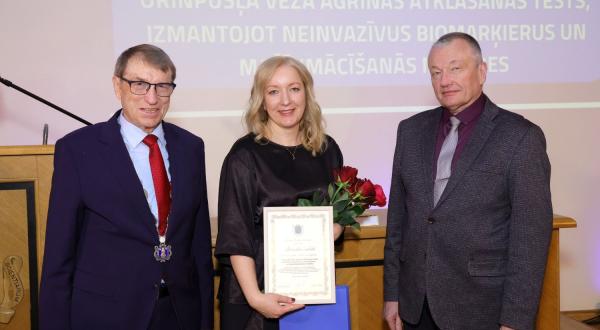RSU student researches Latvian women's understanding of menopause
By: Jeļizaveta Kolosovska (6th-year student at the RSU Faculty of Medicine)
Scientific editor: Dr. Elizabete Ārgale, MD, MBA
Menopause is a vague concept for women of reproductive age, despite its significance and the fact that it is an integral part of every woman's life. Studies1 conducted in the UK and Canada on women’s knowledge about menopause show that younger women tend to perceive menopause and the associated changes more negatively2, with one of the main reasons being a lack of information. Therefore, the most important facts about menopause should be accessible and understandable, as women of perimenopausal age make up a significant proportion of Latvia’s population. Moreover, women outnumber men in society after the age of 42.
 Photo: Courtesy of Shutterstock.com
Photo: Courtesy of Shutterstock.com
This survey includes participants aged between 18 to 49 (according to the World Health Organization, the reproductive age range is 15 to 49), with an average age of 39. The majority of them are active in the workforce (77%) and have a higher education (72%). The study provides insights into how well women are prepared for this stage of life and what factors might influence the severity of menopause symptoms in the future. Based on the study’s results, it will be possible to identify current trends and issues, as well as to propose further research, develop informative materials, and promote public education about menopause, which would contribute to improving the health and quality of life of the Latvian population in the long term.
The survey reveals that most women of reproductive age (94%) understand the term “menopause”, and 93% understand that this process affects every woman. Approximately 65% recognise that the cessation of menstruation is part of the menopause process, while 76% recognise changes in sex hormone level as one of the most important signs of menopause. 92% of respondents recognise that menopause symptoms can appear before the age of 50.
Hot flashes, sleep disturbances, irritability?
What symptoms do women believe can occur during menopause? According to the survey, 93% of women recognise that hot flashes are a symptom of menopause, and 80% believe that vaginal dryness is associated with menopause, while 60% recognise that a decrease in libido is a sign of menopause. Women surveyed recognise that during the menopausal transition, women may experience weight gain (66%), mood changes (82%), sleep disturbances (69%), and memory decline (72%). In addition, 55% believe that menopause symptoms negatively affect quality of life, and 71% consider menopause to be associated with general decline in health. 50% believe that menopause may increase the risk of cardiovascular diseases (e.g. high blood pressure, heart attack, stroke).
Such changes are indeed possible. Why? In the context of menopause, the hormone oestrogen plays a key role, and its decline leads to changes in the menstrual cycle – often the first sign of the transition period. As oestrogen decreases, the internal structure of the genitals changes, and the skin of the external genitals and the vaginal mucosa become thinner and less elastic. This can lead to symptoms such as vaginal dryness, itching, and pain during sexual intercourse, which in turn can affect sexual desire or libido. Additionally, changes in the urinary system increase the risk of urinary tract infections and urinary incontinence. The most well-known symptoms of menopause are hot flashes and sweating – these symptoms can vary in severity.
Insomnia and waking up during the night may be associated with these symptoms, and the overall quality of sleep may also deteriorate during menopause, affecting work capacity, mood, and ability to concentrate.
Hormonal changes and severe symptoms can also affect psychological and cognitive well-being. During this period, women are at an increased risk of experiencing anxiety, stress, irritability, and depression. In general, the symptoms mentioned above affect not only women’s health but also their quality of life.
Hormonal changes related to menopause can directly and indirectly affect the development of cardiovascular and bone diseases, as well as increase the risk of obesity, insulin resistance, and diabetes. These health risks should be assessed individually, as they may be related not only to age but also to other factors such as smoking, eating habits, physical activity.
Can symptoms be influenced before menopause?
Although menopause refers to a specific stage of life, lifestyle before menopause can still greatly affect the course of menopause.
Therefore, more education and support are necessary to promote a healthier lifestyle and better prepare for the menopausal transition to raise awareness about this process in the future and to maintain overall health. This is essential for preserving a high quality of life during the pre-menopause period, making it easier to navigate this stage and maintain well-being afterward.
About the study
A total of 557 respondents from Latvia aged 16 to 64 participated in the online survey of the final research paper. For analysis, 431 women of a reproductive age from Latvia were selected to assess their knowledge about symptoms characteristic of menopause and to learn about their lifestyle habits.
References
1 Munn, C., Vaughan, L., Talaulikar, V., Davies, M. C., & Harper, J. C. (2022). "Menopause knowledge and education in women under 40: Results from an online survey." Women's Health, 18, 17455057221139660.
2 Patel, V., Ross, S. & Sydora, B. C. "Assessing young adults' menopause knowledge to increase understanding of symptoms and help improve quality of life for women going through menopause; a student survey." BMC Women's Health 23, 2023, p. 493.
Source: LSM.lv




